Looking back at the first song written about Uncle Ho
Vietnam is proud to possess a rich musical treasure, in which songs about President Ho Chi Minh always hold a special and sacred position. These songs not only praise the great example of the beloved leader, but also truly portray the image of a person with the national image and a shining symbol of the Vietnamese people and nation.
Each song has its own nuances but they all have in common that they are written with sincere feelings, deep gratitude and infinite love of many generations of musicians for the Father of the nation. People often say: "Everything that comes from the heart will touch the heart" and perhaps that is why every time those familiar melodies resound on the radio and television, millions of hearts are touched, moved and proud.
When discussing songs about Uncle Ho, we must certainly mention works that have become immortal such as “ Ho Chi Minh is the most beautiful name” by musician Tran Kiet Tuong, “Singing about Him” by musician Doan Bong, “Who loves Uncle Ho Chi Minh more than teenagers and children” by musician Phong Nha or “Like having Uncle in the great victory day” by musician Pham Tuyen… These are all familiar songs, going through the years, entering the hearts of many generations of Vietnamese people.
However, to have such a huge treasure as today, we cannot fail to mention the first songs written about President Ho Chi Minh, the works that laid the foundation for portraying his image in music. It was these songs that paved the way, inspired the image of Uncle Ho to become a sacred theme, spreading strongly in the compositions of most great musicians in the 20th century.
Looking back at the history of Vietnamese revolutionary music, from the dawn of modern music, when the country was still in the flames of war and the desire for independence, the image of Uncle Ho has become an endless source of inspiration for musicians. One of the first songs written about Uncle Ho was “Grateful to Uncle Ho Chi Minh” by musician Luu Bach Thu (pen name Thu Trang).
Witnessing the image of Uncle Ho, both great and simple and close to the people, at the Independence Declaration ceremony on September 2, 1945 at Ba Dinh Square, Hanoi left a deep impression on musician Luu Bach Thu. The intense emotions from that sacred moment became the inspiration for him to compose a song expressing his deep feelings and gratitude towards Uncle Ho.
The song “Grateful to Uncle Ho Chi Minh” was first performed at San Nhien Dai Theater on Dao Duy Tu Street (Hanoi), within the framework of the Conference summarizing the work of protecting security and order in the early days of the newly successful revolution by the Hang Trong Station Police. Immediately after that, the song continued to be selected to perform at the Conference to meet people with meritorious services to the revolution, organized by the Hanoi People's Committee (now the Hanoi People's Committee) at the Opera House. With its passionate, sweet melody and easy-to-sing, easy-to-remember lyrics typical of the chanson populaire genre (mass song): “Oh, people of the South, forever grateful to Uncle Ho. How many years of living in danger and misery…”, the song received a warm welcome from delegates and the people. From then on, the song spread from North to South through word of mouth.
However, it was not until after the restoration of peace in the North in 1954 that the song was officially arranged and recorded at the Voice of Vietnam Radio. Since then, “Grateful to Uncle Ho Chi Minh” has continued to affirm its enduring vitality, transcending time. To this day, the song is still occasionally played in music programs, especially on the occasion of Uncle Ho’s birthday, as a profound and sacred gratitude of the People for their beloved leader.
As the lyrics and melodies continue to echo
Following the first song, after a short time, the image of the great leader appeared again in songs by musicians Minh Tam, Nguyen Van Khanh, Luu Huu Phuoc, Do Nhuan, Van Cao. The common point of the songs about Uncle Ho in this period is the spirit of exalting him as a very great and sublime symbol. From the lyrics to the melody, there is a tendency towards hymns - that is, praising him like a saint. This is a characteristic clearly seen in the musical compositions of the early period of the resistance war. Because after 1954, when the country entered the period of peace building in the North, the image of Uncle Ho in music gradually became closer, more ordinary, like a Father, a friend, a leader in the hearts of the people.
The most typical example of this trend is the song “Praise to President Ho” by Luu Huu Phuoc. This song was composed in 1947, from the author’s love and respect for the President who devoted his life to the country and the people. The song is short, concise, and has a solemn and profound melody. When performed in chorus, it creates a rich, full-bodied sound, very suitable for honoring the image of a great leader. It is the harmonious combination of lyrics and melody that helped “Praise to President Ho” quickly spread widely right from its inception.
 |
The song "Grateful to Uncle Ho Chi Minh" has Uncle Ho's signature. (Photo: Document) |
A special point related to this song is that in 1951, musician Luu Huu Phuoc himself proactively asked poet Nguyen Dinh Thi to edit the lyrics, making the content of the song more suitable to Uncle Ho's qualities of modesty, simplicity and closeness to the people. For that reason, the song we listen to no longer has many of the old lyrics, but instead has new lyrics: "The golden star flutters with bright pink light" and "Ho Chi Minh leads our people, steadfastly fighting for our lives". Until now, "Praise to President Ho" is still one of the most mentioned songs in the topic of writing about Uncle Ho. Not only that, the song is also considered a Leader's song, just like Van Cao's "Tien Quan Ca" is the National Anthem, Do Minh's "Welcome to the Communist Party of Vietnam" is a Party song.
After the end of the resistance war against the French, after 1954, songs about President Ho Chi Minh gradually lost the nature of hymns as mentioned above. Two of the best songs born during this period were “Tieng hat gioi rung Pac Bo” by Nguyen Tai Tue and “Ho Chi Minh dep nhat ten nguoi” by Tran Kiet Tuong. If “Tieng hat gioi rung Pac Bo” expressed the feelings of the people of Viet Bac for Uncle Ho through the Tay and Nung folk songs in Cao Bang. Then “Ho Chi Minh dep nhat ten nguoi” expressed the gratitude and deep affection of the people of the South for him through 6 comparisons using the word “more” in the lyrics of the Dong Thap folk song.
Not only were there many songs praising President Ho Chi Minh during his lifetime, but many good songs about him were also written after his death and many years later. The day he passed away, that great loss left an inescapable void in the hearts of the entire Vietnamese people. During the days of mourning, many musicians spoke their hearts through emotional songs, like tears blending into melodies to send him off. A typical example is the song "You are the belief in certain victory" by musician Chu Minh with lyrics and melody imbued with sadness and remembrance.
Later, when the country entered the period of construction and development, the music written about Uncle Ho also gradually changed. Instead of just praising with solemn nuances like hymns, musicians began to express the image of Uncle Ho in a more intimate, everyday way, like a grandfather, a father, a teacher. Music at this time tended to evoke feelings of pride, reminding generations to follow Uncle Ho's teachings, to live and contribute worthy of the belief he left behind.
After 80 years since the first song, Vietnamese music has witnessed the birth of countless good and impressive works written about President Ho Chi Minh. However, it seems that that is still not enough. Until today, the image of Uncle Ho is still an endless source of inspiration, continuing to evoke the creative emotions of many generations of musicians, including young musicians, whenever they pause to remember the beloved leader of the nation.
Source: https://baophapluat.vn/chu-tich-ho-chi-minh-nguon-cam-hung-bat-tan-trong-trai-tim-nguoi-nhac-si-post548691.html


![[Photo] Close-up of Tang Long Bridge, Thu Duc City after repairing rutting](https://vphoto.vietnam.vn/thumb/1200x675/vietnam/resource/IMAGE/2025/5/19/086736d9d11f43198f5bd8d78df9bd41)
![[Photo] President Luong Cuong presents the 40-year Party membership badge to Chief of the Office of the President Le Khanh Hai](https://vphoto.vietnam.vn/thumb/1200x675/vietnam/resource/IMAGE/2025/5/19/a22bc55dd7bf4a2ab7e3958d32282c15)

![[Photo] General Secretary To Lam attends the conference to review 10 years of implementing Directive No. 05 of the Politburo and evaluate the results of implementing Regulation No. 09 of the Central Public Security Party Committee.](https://vphoto.vietnam.vn/thumb/1200x675/vietnam/resource/IMAGE/2025/5/19/2f44458c655a4403acd7929dbbfa5039)

![[Photo] Panorama of the Opening Ceremony of the 43rd Nhan Dan Newspaper National Table Tennis Championship](https://vphoto.vietnam.vn/thumb/1200x675/vietnam/resource/IMAGE/2025/5/19/5e22950340b941309280448198bcf1d9)
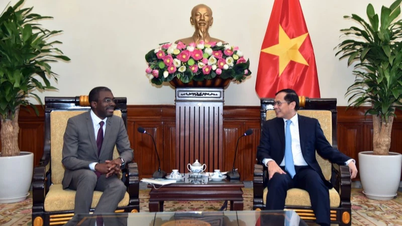



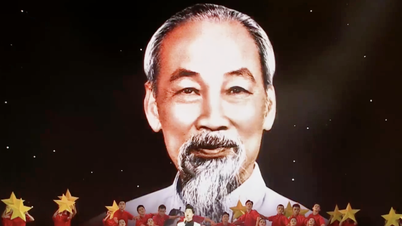

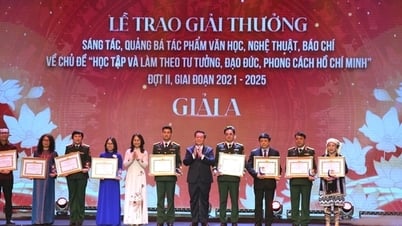

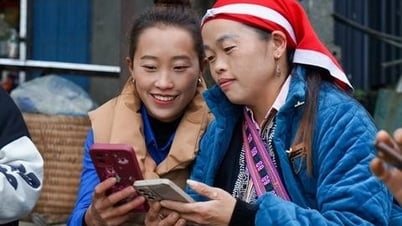
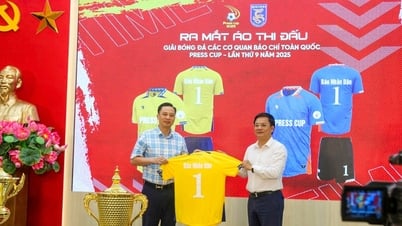




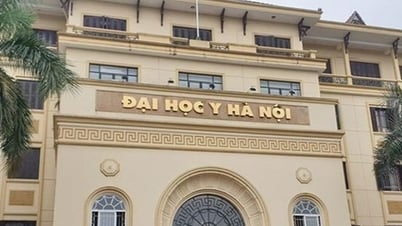



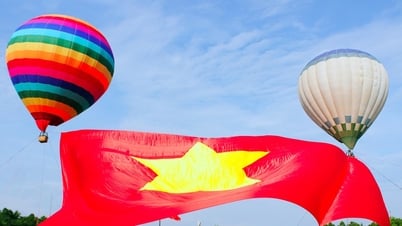

![[Photo] Prime Minister Pham Minh Chinh inspects the progress of the National Exhibition and Fair Center project](https://vphoto.vietnam.vn/thumb/1200x675/vietnam/resource/IMAGE/2025/5/19/35189ac8807140d897ad2b7d2583fbae)
















































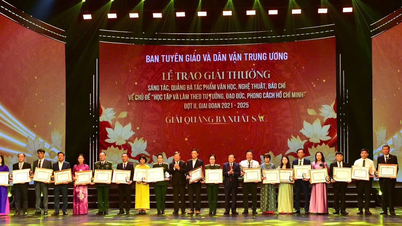





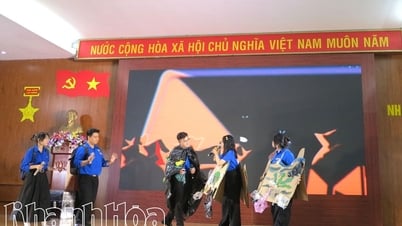





![[VIDEO] - Enhancing the value of Quang Nam OCOP products through trade connections](https://vphoto.vietnam.vn/thumb/402x226/vietnam/resource/IMAGE/2025/5/17/5be5b5fff1f14914986fad159097a677)



Comment (0)